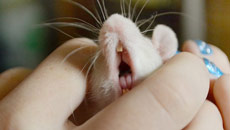Inspired by Google Glass, researchers have now developed a wearable eye-monitoring device that could lead to early detection of a common diabetes-related neurological condition.
Diabetic autonomic neuropathy is common among people with both Type 1 and Type 2 diabetes.
The new technology is a small, wearable device called a pupillometer that can hang on a pair of eye-glasses and only weighs 78 grams - slightly heavier than Google Glass.
"Compared to the existing diagnostic techniques, the pupillometer is a more reliable, effective, portable and inexpensive solution for diagnosing diabetic autonomic neuropathy in its early stages," claimed lead researcher Mang Ou-Yang from National Chiao-Tung University in Taiwan.
The device is designed to be worn for half an hour or so in the doctor's office, during which time it would monitor a person's pupils.
By carefully measuring five parameters associated with the pupils, doctors may then be able to detect the earliest signs of diabetic autonomic neuropathy.
The condition progressively affects the autonomic nerves controlling vital organs like the heart and gastrointestinal system. This can lead to problems like fainting, incontinence, nausea, heart arrhythmias and an increased risk of bacterial infection.
Detecting someone's asymptomatic diabetic autonomic neuropathy early and treating it properly may lead to far better health outcomes for them.
Currently, the condition is often not detected until moderate nerve damage and organ dysfunction are present.
"To diagnose, doctors rely on observing changes in digestive speed, heart rate and blood pressure to detect diabetic autonomic neuropathy but this limits their ability to make a diagnosis early on," Ou-Yang added.
Monitoring the pupils of people with diabetes may be a better approach, the findings, appeared in the journal Applied Optics, showed.





